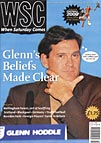 Contrary to past belief, it seems these days you never win anything without kids. Matthew Hall questions Leeds’ intentions in Australia
Contrary to past belief, it seems these days you never win anything without kids. Matthew Hall questions Leeds’ intentions in Australia
It's usually after about three or four pints down the pub: “With the influx of all these foreigners,” grumbles some old sop, “there’s no future for homegrown talent in the English game any more.” A complete load of crock, of course, as readily demonstrated by most of the big clubs introducing outstanding young players more than capable of holding their own alongside big-money international signings.
And what about that Leeds, eh? “O’Leary’s Lads” and all that? Well, funny you should mention it. For, despite the current crop of Leeds United first teamers proving that the Yorkshire club’s youth development policy is top rate, there are signs that a new influx of foreigners may suggest a limited future for local wannabes.
Similar to West Ham’s Australian “academies”, Leeds have established formal arrangements with a school in Sydney and a junior club in Perth. In return for providing financial assistance, Leeds are granted the opportunity to take the best local players on trial to England. Nothing wrong with that, you may say, and up to a point you’d be right.
Leeds, though, see no limit to their Antipodean recruitment efforts. In fact, Alan Hill, director of the Leeds youth academy, feels that Australia is such a fertile breeding ground that he foresees a time when half of Leeds United’s first team will consist of players signed through the scheme. “With the development programmes that are in Australia – along with the diets, the nutrition, the natural athleticism – Australia has quality players,” he says. “If you compare the Australian lads with the English boys who are 14, the Australians seem to be 18 years old.”
Add the club’s interests in Ireland and a scenario could arise where a so-called “homegrown” team is, in fact, staffed by “foreigners”, young, talented, strong and cheaper than chips. Leeds, though, are a step ahead. All Australians signed (some as young as 14) must renounce any claim to play for Australia and instead choose to fulfil international ambitions with England, Scotland, Wales or Northern Ireland.
Leeds say the policy is a direct result of the international tug-of-war over Harry Kewell last season. “If a player chooses to play for Australia then we’re wasting our time,” claims Hill. “If in eight years we lose matches without those important players because they’re on international duty it could be the difference for our club between a championship and relegation and £30 million income.”
Sixteen-year-old Jamie McMaster is the first Australian signed by Leeds under the scheme, one of only 11 players who made the cut for their youth academy last year. He was selected in the England Under-16 squad for a friendly against Turkey in January. The club have also signed 14-year-old Matthew Hunter, part of an even smaller intake for this year. Leeds have Hunter flagged to play for Scotland, where his parents were born. Hill denies that players are placed under any pressure to decide which country they wish to play for, but the situation obviously presents a difficult conundrum for a 14-year-old offered lucrative professional terms with a major British club.
“It’s always been my dream to play for the Socceroos, ever since I was young,” says McMaster in a broad Aussie accent. “I’ve had a lot of advice from people here not to play for Australia so I’ve decided to play for England at this age. I don’t know what it will be like in the fut-ure.” Under FIFA statutes, once a player has represented a country in an official competition – at any age level – he is then ineligible to play for another country. The decision on McMaster’s international future may be made in early February when England are scheduled to play in a UEFA tournament in Cyprus. Not surprisingly, the case has created a furore in Australia.
None of the players Leeds have signed was born in the UK – they qualify for British selection through ancestry. McMaster has English-born parents and is enrolled at a local school while living at the Leeds academy. Leeds are not acting illegally, of course. But it could be argued that undue pressure is being placed on starry-eyed young players. Such a policy puts a club on shaky moral ground, and could also be said to discriminate against Australian youngsters with no UK ancestry.
Reports suggest that Leeds have also enquired about establishing a Sydney-based franchise to compete in Australia’s national league.The club could be in for an interesting reception from fans.
From WSC 145 March 1999. What was happening this month